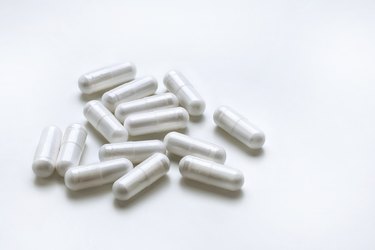
A DIM supplement contains a component of cruciferous vegetables called diindolylmethane, which has been promoted for its effects on creating a healthy balance of estrogen and testosterone. Scientists are seeing positive results from the effect of DIM on preventing and treating certain cancers.
Tip
Diindolylmethane, also called DIM, is a compound found in vegetables like broccoli and cabbage. DIM supplements are taken at the therapeutic dose of 300 milligrams per day for protective benefits against certain cancers.
Video of the Day
What Is DIM?
DIM is a shorthand way to refer to diindolylmethane, which is a component found in cruciferous vegetables such as Brussels sprouts, broccoli, cauliflower and cabbage. There has been a lot of buzz around DIM because scientists are excited about the connection between diindolylmethane and its effect on cancers.
Video of the Day
DIM supplements contain a concentrated dose of diindolylmethane without having to eat literally pounds of vegetables. A July 2016 study published in Nutrition Reviews says you would have to eat 1 1/2 pounds of raw cruciferous vegetables, per day, for several years, to get the same dosage as that used in the study for the anticancer benefits.
The researchers do point out, however, that more studies need to be done on the best dose protocol for DIM and how that applies to including these vegetables in your diet.
Benefits and Dosage of DIM
There have been several studies on DIM and its potential for preventing cancer, as well as its therapeutic effects when used with chemotherapy.
- Breast cancer: Because of the way DIM reacts with estrogen, its effects on estrogen-sensitive cancers has been studied. The 2016 study in Nutrition Reviews showed that there is evidence supporting the notion of DIM playing a role in preventing breast cancer, as well as having therapeutic effects when taken during chemotherapy. The study points out that more clinical trials are needed to determine the correct dosing for DIM supplements and the corresponding amount you would need to add to your diet for the best outcome.
- Colon cancer: In addition to breast cancer, DIM could also help decrease your chances of developing colon cancer. An April 2019 study in Cancer Letters journal found that DIM suppresses the growth of colon cancer, and could be a therapeutic supplement to take during chemotherapy.
- Cervical cancer: Studies also show that DIM can be effective for treating cervical dysplasia, which can eventually lead to cervical cancer. A December 2015 study in the EPMA Journal reports that there are over 528,000 cases of cervical cancer each year and half of them are fatal. The current treatment for cervical intraepithelial neoplasia (CIN), or dysplasia, is removing the tissue through surgery or laser ablation. However, there's a risk of damaging the cervix ,which can result in pregnancy complications. This study found that intravaginal DIM suppositories were effective for treating dysplasia, without the negative side effects.
What dosage of DIM supplement proved beneficial in these studies? The Nutrition Reviews study found that the microencapsulated DIM or BioResponse-DIM in a dose of 300 milligrams showed the most effective response.
Bottom Line on DIM Supplements
Harvard Health says that although there are a lot of promising studies on DIM, you should talk to your doctor and proceed with caution before taking this supplement, especially if you are of reproductive age or pregnant.
Because of the way DIM blocks estrogen, it could affect your breast and bone health, and it can affect the way your oral contraceptives work. They point out that postmenopausal women could be at increased risk of osteoporosis, because it could reduce the estrogen in the body that helps maintain bone density.
At this point, even though there are some promising studies on DIM supplements, they recommend ramping up your diet with plenty of cruciferous vegetables until more studies are done on the risks and effectiveness.
- Nutrition Reviews: "Chemopreventive Properties of 3,3′-Diindolylmethane in Breast Cancer: Evidence From Experimental and Human Studies"
- Cancer Letters: "3,3'-Diindolylmethane Inhibits Patient-Derived Xenograft Colon Tumor Growth by Targeting COX1/2 and ERK1/2"
- EPMA Journal: "Double-Blind Randomized Placebo-Controlled Multicenter Clinical Trial (Phase IIA) on Diindolylmethane’s Efficacy and Safety in the Treatment of CIN: Implications for Cervical Cancer Prevention"
- Harvard Health: "What Does Indolplex Do?"
Was this article helpful?
150 Characters Max
0/150
Thank you for sharing!
Thank you for your feedback!